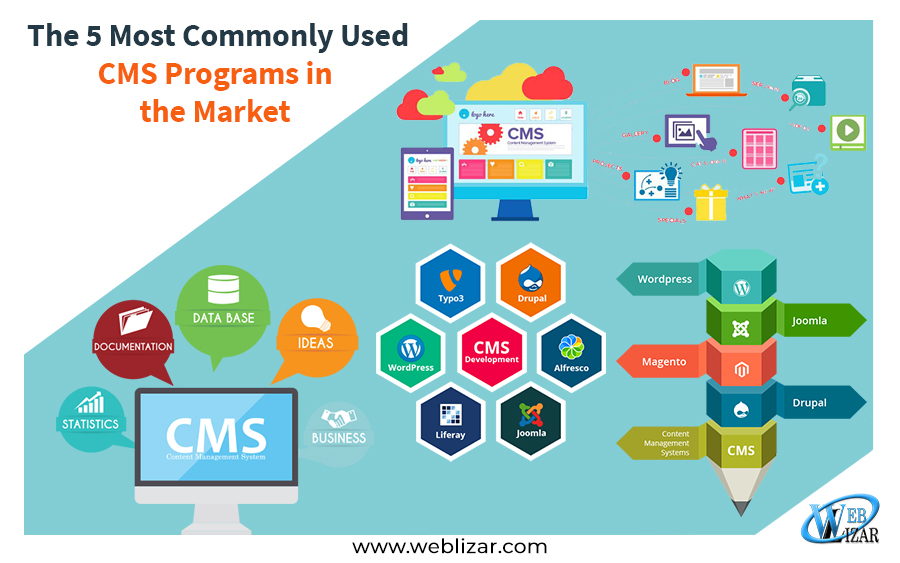5 Most Commonly Used CMS Programs 2024

Ever since CMS programs replaced code, the internet has seen a surge in the number of websites. Content management systems have made it possible for literally anyone to open a website in just a few minutes. The internet is therefore much livelier because of the power of CMS.
One of the most widely known CMS programs is WordPress. WordPress was launched in 2005 and it has become the most common platform for creating websites. It is not just WordPress that is shaping the modern internet though, there are many other CMS software programs out there being used every day. Let us look at the most popular CMS programs by market share.
1. WordPress
We will start off with the king of the market. WordPress is estimated to account for over half of the market’s recent numbers. This content management system has made it possible for developers to create basic websites and even the most complex websites.
Because of its dynamic nature and versatility, the platform has been able to attract users across the board. WordPress accounts for nearly a third of all the popular websites on the internet. It is also the platform that was used to create some of the most iconic websites on the market. Time, TechCrunch, and BBC America are just some of the many popular websites created on the WordPress platform.
ALSO CHECK: Top 10 PHP CMS Platforms in 2024
2. Joomla
Joomla is one of the older content management systems. It was launched just a few months before WordPress in 2005. The platform was launched as an open-source program to connect various database software.
Because of its ability to work with various databases including MySQLi, MySQL, or PostgreSQL databases, this platform has become a popular option for some of the most demanding websites in the financial markets and the business spheres in general. Joomla is nevertheless also used by the average website developer because it has all the tools needed to create a simple functioning website. Joomla is nevertheless a distant second after WordPress.
3. Drupal
The third most popular CMS platform is Drupal. This platform is more of a content management framework (CMF), even though it works great as a CMS. The platform is another open-source software that can be used by virtually any person regardless of their skill level. It is capable of creating and managing a wide range of websites.
Drupal is loved by many because it is simple software. While it does not have the many different plugins that platforms like WordPress have, it is still a very capable platform. It is, in fact, the go-to option for developers who want to create some of the most complex projects.
ALSO CHECK: The 5 Most Commonly Used CMS Programs in the Market
4. Magento
Magento was launched on March 31, 2008. This platform was launched as an open-source content management system for the wider market. As opposed to many other content management systems, Magento tends to be a platform created to specifically address the needs of people in the e-commerce sector.
This is because it comes with various inbuilt merchant tools and cart systems. Indeed, Magento is one of the most popularly used CMS programs in its field. The platform has evolved a lot since it was launched. Nowadays, you can find many different tools that make it capable of handling simple and even complex tasks.
5. Blogger
Blogger was among the first CMS programs to enter the market. This platform was initially not a CMS program. Upon its acquisition by Google though, the platform became a blog-publishing tool. The program was one of the earliest to popularize blogging to the market.
Despite its great background though, it was quickly surpassed by newer platforms like WordPress. Blogger is still a popular option for many though and it continues to enhance blogging services for users. It is currently the 5th CMS platform by market share.
There are many other CMS platforms that you can find on the market. Platforms like Shopify, Bitrix, and Squarespace are some of those that have hit the market recently.
Whether you are looking for content-specific options like Shopify or general-purpose CMS options like WordPress, you can be assured of a smooth experience. The industry has evolved a lot and many of the improvements made on the CMS platforms have reduced the usability gaps.
FAQs”
What are the most commonly used CMS?
Some of the most commonly used Content Management Systems (CMS) include WordPress, Joomla, Drupal, Magento, Wix, Shopify, Squarespace, and Ghost. The choice of CMS depends on factors such as website complexity, functionality requirements, and user preferences.
How many CMS are available in the market?
WordPress, known for its user-friendly interface and extensive plugin support, tops the list. Joomla offers flexibility and strong community support, while Drupal is preferred for complex and robust websites. Magento specializes in e-commerce solutions, providing powerful features. Wix and Square-space are user-friendly platforms with drag-and-drop functionality, catering to a broad audience. Shopify excels in e-commerce, offering simplicity and scalability. Ghost focuses on blogging with a modern approach.
What are the 3 different types of CMS?
Traditional/Enterprise CMS, designed for large-scale enterprises with complex content needs; Web-based CMS, user-friendly platforms like WordPress, Joomla, and Drupal ideal for websites and online content; and Headless CMS, which separates content creation and presentation, providing flexibility for developers to use different front-end technologies while accessing the same content.



Leave a Reply